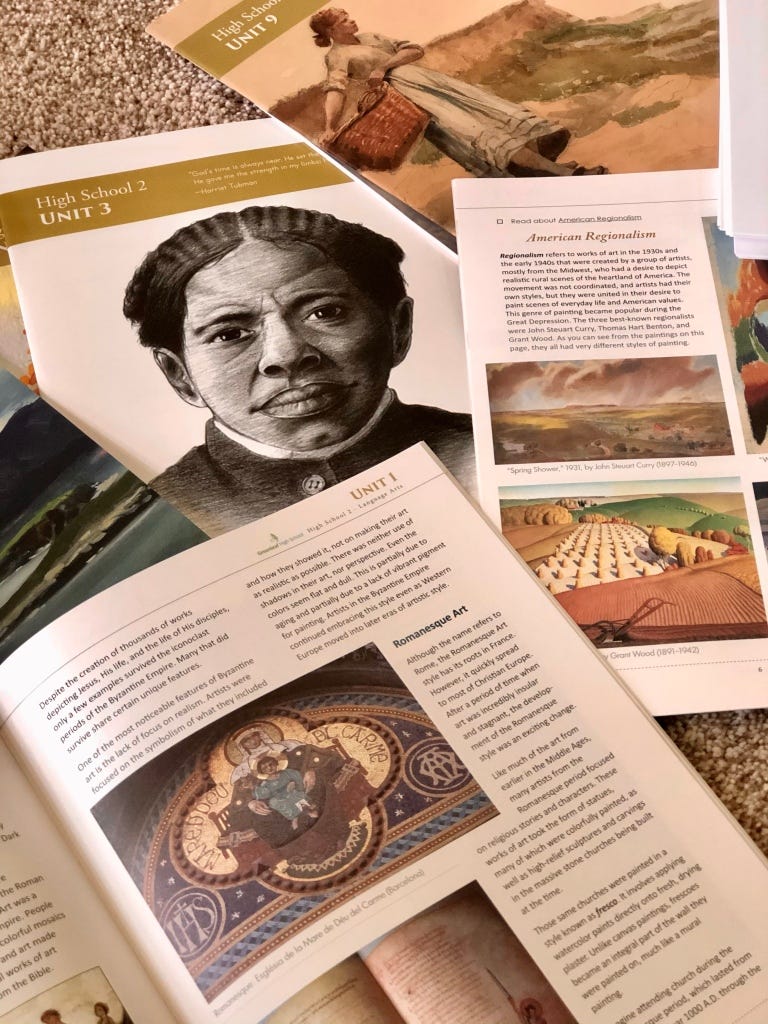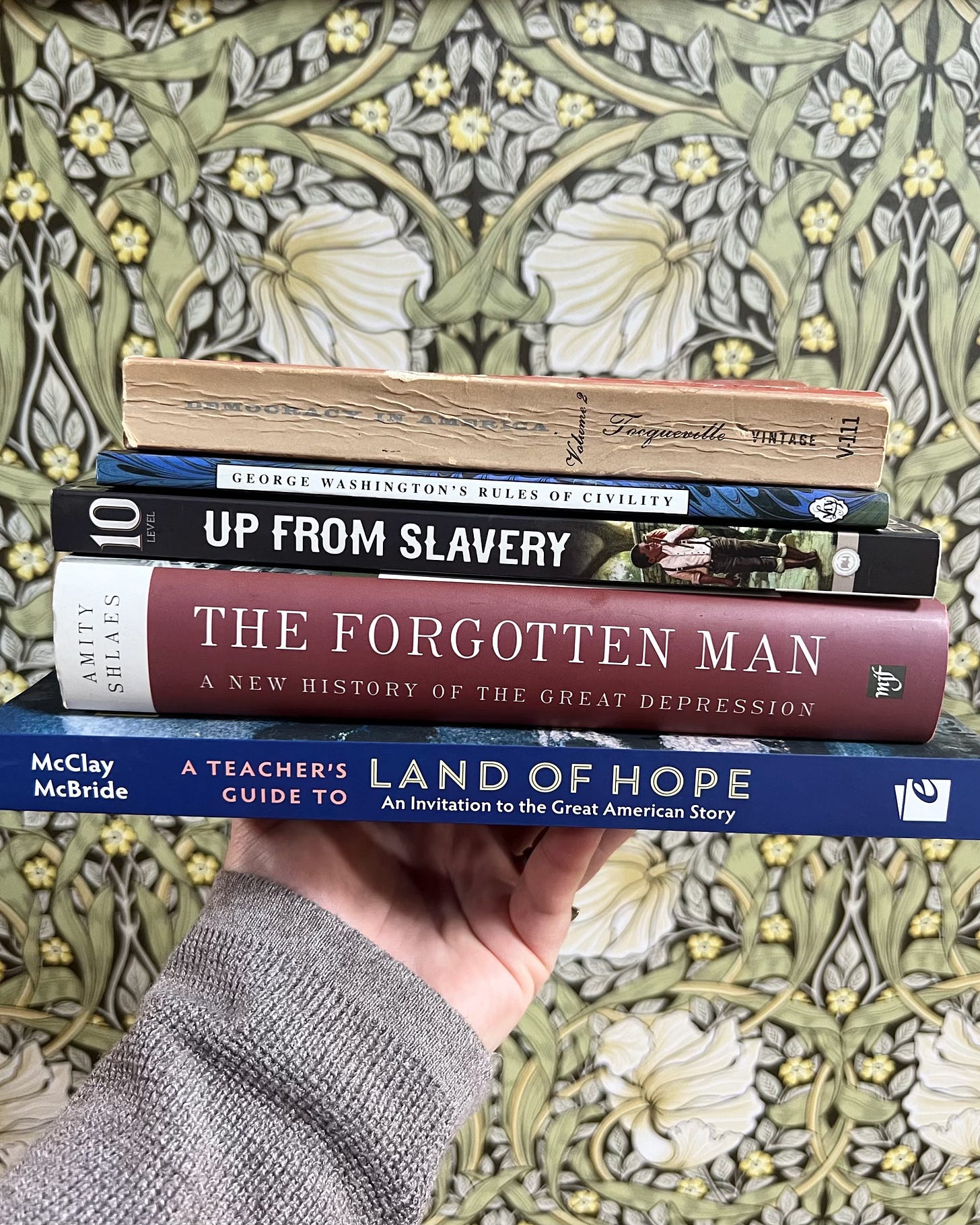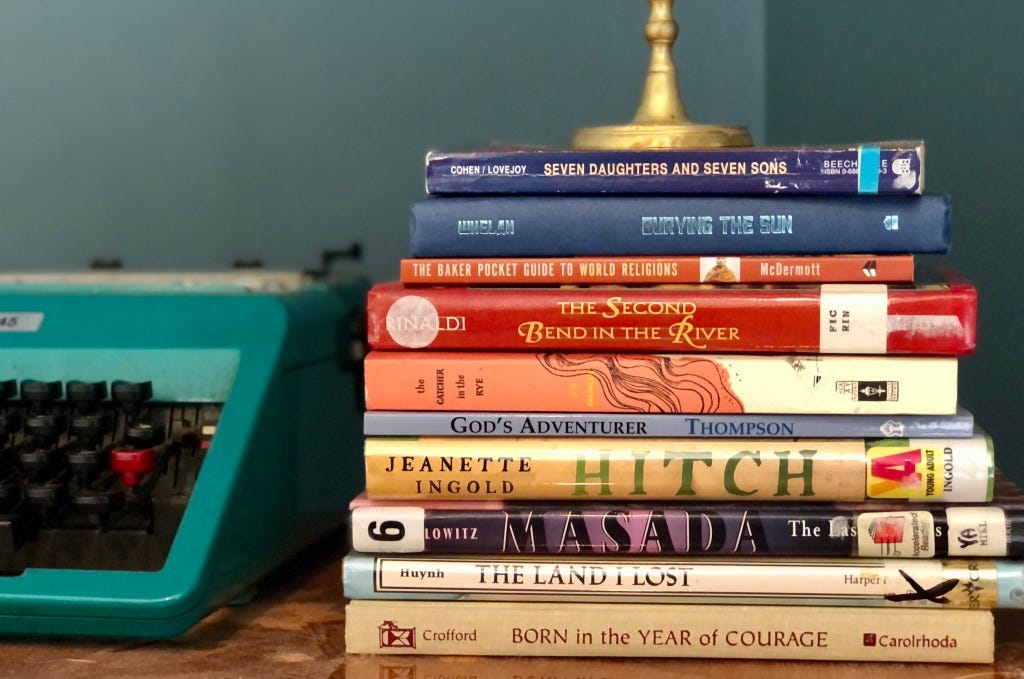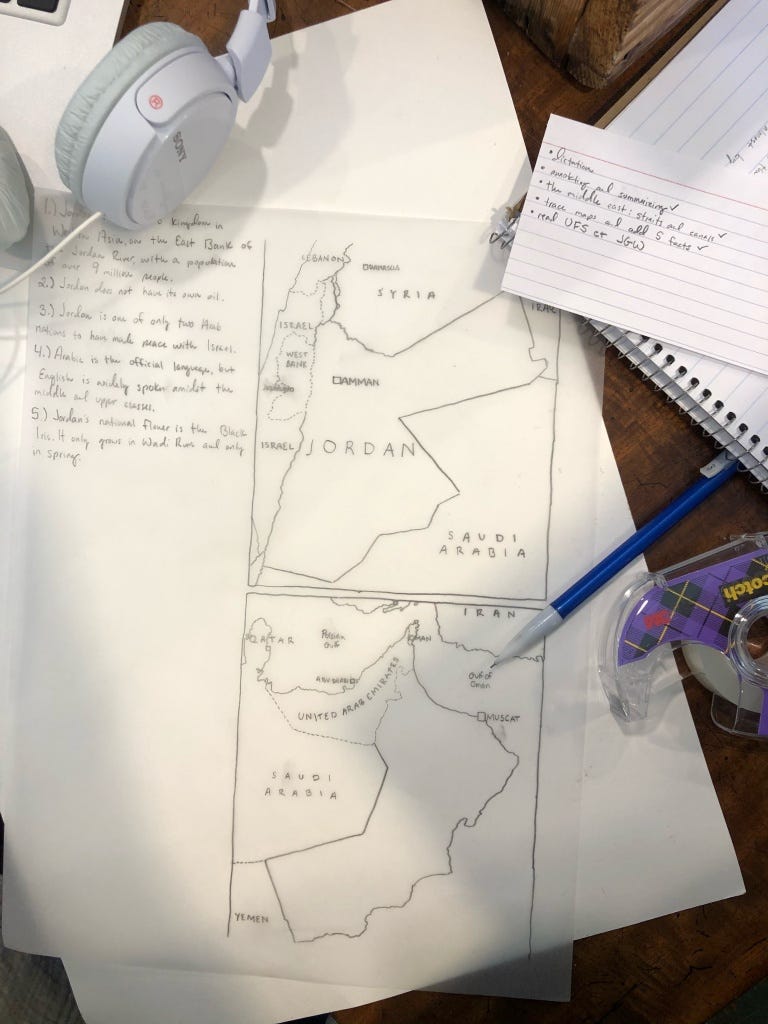After you’ve been homeschooling for a certain amount of years, people begin asking the following question: “If you could give one piece of advice to someone thinking about homeschooling, what would it be?”
Given the chance, I would say many things to my former self. When we embarked on the lifestyle of home education, I had a newly minted 6-year-old old, a 4-year-old, and I was ready to give birth to our third. People thought we were out of our minds. They didn’t get it. Homeschooling bucks the status quo in general, but starting when you have a baby on the way and when there is a wonderful Christian school down the road? We knew it wouldn’t make sense to most people. At that moment in time, I had many veteran homeschoolers give me bits of wisdom like, “1st grade shouldn’t take more than 45 minutes a day” or “Don’t replicate school at home” or “Don’t get hung up on public school standards.” All things I agree with and things that helped me but….
On this side of things, over a decade later (and with another new baby in the house) the one thing I needed to hear was:
Think with the end in mind.
For some families, homeschooling is a temporary solution to a contentious classroom environment. It can be a solution for those who want quality, Christian education but don’t desire to spend thousands of dollars a year on a private institution. It can be a perfect fit for a child who struggles to “keep up” due to a learning difference or a child who sits inside a classroom, bored to tears because they “outpace” their peers. People homeschool for a variety of reasons and 2020 threw fuel on that fire, to be sure. With decades-long inadequacies related to government-controlled institutions becoming increasingly clear, many parents are grabbing their kids and running for the hills. The main concern used to be, “The US doesn’t score that high globally in the area of math” but that is no longer the main concern. I mean, it’s a concern to be sure, but academics isn’t the only thing that compels parents to look for other options. We all know the list: school violence, the proliferation of sexual abuse between students, access to pornography, the illiteracy rate, toxic ideology seeping into the curriculum, safety on school campuses, and on and on. Things are coming into clear focus for many people who might have thought their child was “safe” because they lived in a good school district.
There are many important reasons one might choose to educate their children and I believe the most important of these is the fact that our children are a precious gift and legacy from the Lord – we should desire to pour truth into their minds and souls and to preserve innocence and wonder as long as humanly possible. We have one opportunity to fill their hearts with the most beautiful things this world will offer. We prepare them for what they will encounter and we help shape their beliefs, viewpoints, compassion, truth-detectors, work ethic, generosity, and resolve for that moment they will leave our homes. Similarly, it only takes one incident at school to steal the innocence of a child and the chances of something happening to our kids are high when they spend the majority of their waking hours with other people - most of whom we know very little about.
All children will become like their teachers (Luke 6:40) and so who their teachers are and who they are governed by becomes extremely important. In our present day, it isn’t just one singular master, but a group of them, and in addition to that, it’s their peers. If we are not extremely comfortable with allowing people whom we do not intimately know to babysit our children when we head out for date night, why we would trust them to instruct and shape our children for up to 8 hours a day? Make no mistake, whoever spends the most time with your child will have a stronghold of influence over them – whether that be the television, video games, their peers, the homeroom teacher, their club baseball coach, or you.
Many people will never understand homeschooling and I can see their point of view, certainly. Homeschoolers are still a relatively small minority (but it’s growing rapidly!) and our culture has been lulled into a “norm” when it comes to how children are to grow and learn, but it wasn’t always this way. It wasn’t this way for almost all of civilization (another post for another time.)
All this to say, if you are here and you are questioning things regarding your family structure and priorities, I get it. If you are scared about homeschooling, I get that too. I was there. If you are skeptical, I understand that feeling of questioning. My husband especially gets that – he wasn’t on board at first (but is now the biggest advocate for homeschooling.)
I understand where you are at.
If I could give you advice it would be to picture your child/children about 15 years down the road.
Ask these questions while you picture “the end”:
What is the purpose of their education? What is the priority of their learning? Is it an emphasis on grades and achievements? Do you want a focus on family relationships and time together? Are you desiring a slower pace for your child so that they can work on their timeline? Are you wanting the ability to marry their education with a Christian worldview? Do you want more time with your children in a peaceful atmosphere without running to and fro? What are the worst things that can happen when sending them to school vs what are the worst things that can happen by offering them a home education? What values do you want them to leave your house with and where can they best learn those?
Think with the end in mind, my friends. It answers a lot of those nagging questions.
When Sean and I asked ourselves what we wanted at the finish line, we both knew that the priorities were simple – we had three focuses:
1.) Christ-centered learning. That is, Christ is the bedrock for all the many subjects we will learn about. He created this amazing world and all the things that interest us – from Botany to crochet to violin practice to algebra. He is the foundational aspect and is woven through every lesson and discussion.
2.) Family. We knew that we wouldn’t be satisfied with just two hours together a night and less on weekends if we were all running around to different endeavors. Because of this choice, we limit some activities so we aren’t frazzled with playing chauffeur every evening. We prioritize family time. We sit around together most nights and play games, eat, watch movies, read books, and just talk. We don’t miss each other’s “stuff” for our stuff. We don’t each do multiple activities. Our lives are spent together and with one another and we have seen how sweet it is. We have also noticed how very bonded our children are.
3.) Classical, Literature-based Education. I knew that if I was going to homeschool, there would have to be a strong emphasis on the classics and quality books (see all my favorites here.) Once I decided that, it was off to the races and it’s been a pleasure since. We read the good stuff, the old stuff, and some of the new stuff. We read and read and read. My children may not head off to college with a portfolio detailing the 9 extracurriculars they were involved in, but they’ll have a completed book list of the best from the Western Canon!
These were our three “MUSTs” and it became obvious that we wouldn’t be able to gift these to our children if they had their rears in a classroom seat every day for the first 18 years of their lives. We had to bring them home. By thinking in reverse, our mind was made up. We were nervous and had very little support, but we didn’t have a choice.
So again I’ll say….think with the end in mind. Pray intensely and decide what the Lord is calling you towards and into. Yes, there will be sacrifices and many that people will look at you sideways for making, but I have never
ever
ever
heard a parent say they regret the time they spent educating their child. It won’t always be easy, but man…..it’s been the best job I’ve ever had. By a long shot.
A few words of encouragement before I answer some of your questions:
1.) If you desire to homeschool, you can do it and you can do it beautifully and simply. I would recommend starting with THIS book. It’s wonderful.
2.) Homeschooling need not be anxiety-inducing or stressful. It can be both of those things at times and for a short season, but whether that lasts is up to you.
3.) You do not have to be a teacher by trade or a college graduate to homeschool your kids well. I have met hundreds of homeschooling moms and many of those mothers only had a high school diploma and yet they still graduated kids – most heading off to college (not that that is a litmus test for success, but that’s a whole other post.) A high percentage of the homeschooled kids I know who are at elite colleges or who own their businesses had parents who weren’t academics. Trust me…it is not a pre-requisite.
4.) Homeschool parents do NOT have more patience than you do. We have the same amount. We just have to learn to manage it each day.
5.) Homeschooling need not be expensive. I’m serious about this one. Do not let yourself feel like you need to spend thousands of dollars on curriculum and supplies. In leaner years I think I spent $200 per year on each child. I had to be creative, use my library card a lot, and head out to garage sales and estate sales for fun craft supplies, but it is doable!
6.) Regarding socialization: 100% of children are socialized. It isn’t if your child will be socialized, it is by whom will they be socialized. I’ve taught in public and private schools and worked with children for over 25 years and there isn’t an overwhelming social deficiency in homeschooled children. Perhaps there was the perception of one at one point in time as homeschooling was such a small grouping of people, but no longer. Let’s get rid of this myth and move on.
7.) When you homeschool you are with your family all the time. This seems to be one of the largest roadblocks for some people because it is different than how the normal family unit functions in our modern society. It is counterculture for a family to be together and eat all their meals together, let alone learn together – different ages and interests included! I will say that, yes, it is an adjustment and you will make sacrifices. But what may start as your biggest roadblock for homeschooling might just turn into the biggest blessing of your life. I had no clue how close a family could become when they do everything together. It’s a rope that cannot be broken. It’s a wonder and it’s a gift Sean and I could never have imagined.
8.) You will make sacrifices. It might be a job, it might be luxuries you have to forgo because one person is no longer working, it might be saying “not now” to a Master’s Degree in US History (ahem….), it might be your yoga class, it might be your quiet bathroom breaks and it will certainly be your free time. But what you “give up” will be returned to you 100 fold. Trust me.
9.) People will not understand and might think you are making a mistake. Some will say it but most won’t. They’ll especially think about it when your child moves toward high school. It’s alright – trust in the Lord.
10.) There is not one “perfect” curriculum. There are TONS of options out there and they all are loved by someone but they might not be a perfect fit for your needs and preferences. If you are looking for some recommendations, I would ask 2 or 3 trusted friends for their thoughts. There’s also a wealth of podcasts and books that can help.
11.) God is generous in ways you have no idea and when you are following His will for your life and trusting in Him, He will equip you and give your children exactly what they need. Hold fast to Him, pray, love your spouse, and read a good book every day. It will be enough.
Look down that path and think about what you want for your children in 15, 20, 30 years from now. Ponder the desire of your heart and what you feel the Lord is asking you to do. Keeping the end in mind has granted peace on the most harried of days and comfort when we are weary. Where He is guiding you, He will surely equip you…..all the way to the end.
- - - - - - - - - - -
Commonly asked questions
1.) What math curriculum do you recommend?
We have always used Math U See and love it. It is mastery-based which means that a student needs to understand a concept before moving on as opposed to a more cyclical style where they repeat concepts throughout lessons but children can move on even if they don’t “get” it fully. The program comes with video lessons that your student can watch that explain the lessons (Mr. Steve is fun!) and the format is very easy. There are lessons that you can use from kindergarten to senior year of high school. It goes all the way from learning to add through Calculus.
2.) How do I homeschool high school?
Pretty much the same way you homeschool any age. Find out what your state requires for high schoolers to graduate and lay out a four-year plan to meet those requirements while also leaving room for personal interest and what is important for YOUR family. Don’t be intimidated by the idea of homeschooling high school. It’s not as frightening as you might make it out to be. We are two years in and love it.
3.) I’m leaning toward Charlotte Mason but pressured to start sooner. Thoughts?
Well, I would say that anything that makes you feel “pressured” as a homeschooler is not working for you. Don’t let anyone make you feel you ought to align completly with their method of teaching. It should be a joy and should fit your family’s rhythm. Charlotte Mason was an extraordinary woman with wise advice for those who care about the education of children but the CM method isn’t for everyone and THAT IS OK.
4.) I so often am afraid about not doing enough and that my kids will be “behind.” Help!
I guess my follow-up question to that concern would be, “Behind who?” I mean, think about it. If we want to take an honest look at the academic argument, you shouldn’t be concerned at all, considering half of our country’s children graduate unable to adequately read. If you care enough to homeschool that means you care more than any teacher or instructor will ever care - it also means that you won’t let your child flounder. He will be right where he is supposed to be and learning in a way that is unique to him.
5.) How long does school take you?
It changes all the time as seasons of life change. When we started and my eldest was in kindergarten I pushed her too hard and we would “do” school for 2 hours a day. I was nervous and wanted to cover all my bases (whatever that meant.) As time went on I realized that time has virtually nothing to do with retention, enjoyment, or real learning. However, on average my teenager now does 4-6 hours of schoolwork a day (because she’s a crazy over-achiever and loaded up her schedule this year,) my 13 year old can finish her work in about 2 hours, and my 9 year old can be done in 1 hour. The rest of the day is spent on chores, practicing their instruments, games, outdoor time, cooking, baking, reading, hanging out as a family, and personal pursuits.
6.) Do you think an empty nest hits harder for homeschool moms than public school moms? How do you manage?
I think it does. I am already trying to be honest with the sadness I’m feeling creeping in as my oldest is about two years from graduation. When educating your children (and spending the majority of your time with them) is the center of your life for two decades, it will be a hard pivot when that changes.
I mean, you could just have a baby when you’re 43 so you’ll always have kiddos in the house - ha!
7.) I’m new to Classical/Charlotte Mason homeschooling with an 11 and 9-year-old. Feels too late to do it well!
It’s never too late to start something beautiful. Imagine someone learning to read when they are 60 but saying they weren’t going to read any books because it’s too late to read all the books they want to! That would be nonsense. My advice is to not focus on what you’ve “missed” by starting now and just beginning where you are. Don’t go back and try to make up all that time. Just start now and enjoy!
8.) I’m often asked how to do transcripts for homeschool - help!
One piece of advice I give ALL new homeschoolers is to become a member of HSLDA. They will legally support and represent you in the case of something in your state coming up AND they have help for all sorts of concerns, including transcripts and recordkeeping. They have representatives you can speak with about your state’s specific requirements and programs you can enroll in that will walk you through the process and provide you with a transcript at the end. That being said, even if you don’t become a member of HSLDA you can easily find explainers online for how to construct a transcript!
9.) I’ve only one child who is 11. Is it possible to find ways to socialize him if we homeschool?
I wrote a bit about this above, but absolutely. Every child is socialized, it just differs on HOW and BY WHO. So, if you homeschool, you’ll find other outlets for them to make friends and interact with others - church, sports teams, extracurricular activities, etc. In all honestly, the vast majority of homeschoolers I know are highly sociable and often much more capable of socializing with all age ranges than their counterparts who are in school all day with 30 kids their same age.
10.) Where do I start with littles? I have a two-year-old who is craving to learn.
If you want to suck the love of learning right out of them, replicate school at home. It will zap that craving. Don’t start doing “school” ( I mean unless you and your child are the rare exceptions that thrive from doing homework at that early age.) I would encourage you to READ, READ, and READ SOME MORE to that baby and pick fun activities to do surrounding your reading journey! If you read about apples, bake an apple pie together (math, reading, and home ec - done!.)
Take it from someone who pushed “school” on my firstborn too early - don’t. Just read and explore the world together.
11.) How do you handle the bad attitudes and resistance to doing school work?
I’m a bit of a tiger mom when it comes to this issue. I don’t put up with it. I don’t allow bad attitudes or resistance when it’s something they need to do (math comes to mind.) I mean, they can try, but I tell them to quit it and do their work. If they fight me, I remove something they enjoy doing until they have done their work with a good attitude for a few days. I’m sure that sounds mean, but they need to learn that not everything is rainbows and lollipops. We all have to do things we don’t want to from time to time.
12.) What are your time management tips? I feel like there’s so much to do! How do you juggle it?
As with many of the other answers, there are different seasons. There have been years when my house was much more tidy and years when I felt like I had more margin. That being said, I often make the following joke: There’s the “clean house” wife, the “in shape and work out all the time” wife, the “makes amazing meals” wife, the “plays all the time and makes incredible crafts with her kids” wife, and the “informed and praying” wife. PICK TWO because you can’t have all five.
And it’s true. I have a very clean house most of the time and am super informed and involved at our church. But I also don’t go out with the ladies often, I don’t work out nearly as much as I need to, and I don’t cook gourmet meals (although my meatloaf is killer.)
What I’m saying is that no mother (especially one who dedicates a large portion of their life to educating their children) will be able to juggle it all. You can’t and you shouldn’t. So, get used to picking only a few things and doing those well. It will mean you will have to let go of other things and that is good. There will be a season for those.
(Also, home management gets easier the old the kids get because they participate in chores more!)
13.) What is the most important thing to teach your children?
To love and follow the Lord Jesus Christ.
Followed by instilling a love of reading.
14.) Do you hit a slump each year and how do you push through it?
Yep - usually around mid-February. If I feel the melancholy coming on, I usually “cancel” school for a day or two and just bake, watch movies with the kiddos, or hit up the used bookstore of a local museum. It helps!
15.) What’s the first thing you would caution a new homeschooler against?
Comparison. Don’t compare yourself to other homeschool moms, don’t compare your family to other homeschool families, and DO NOT compare your children with other homeschooled children.
It’s a surefire way to deplete your joy and lose sight of God’s graciousness and goodness in your situation.
- - - - - - - - -
I hope this post is encouraging and helpful. Remember, if the Lord is nudging you toward this lifestyle (and it is a lifestyle!) then He will most certainly equip you. Pray and seek Him and please please please….delight in your children. Our time with them is so short and what a waste it would be if we spent it being an old, cranky schoolmarm. We can have high expectations, yes, but we must also remember we are training their hearts and minds to love truth and beauty. What a beautiful responsibility!















Wonderful post, Rachel! We have always homeschooled our 3 kids. My oldest is graduating college this year. She still spends almost every Sunday with us. The close relationship you build with your children is the best!! I have 2 more at home and they will graduate in 2 years. I am starting to try to figure out how I will survive without them!😢
Yes, yes, yes! What a great post on homeschooling! Keep up the good, hard work with your children. 💕 Wanting to share these posts as it supports your comments on having the end goals in mind. Enjoy!
https://open.substack.com/pub/brookezoller/p/the-__-main-things-my-adult-children?r=54uqv3&utm_medium=ios